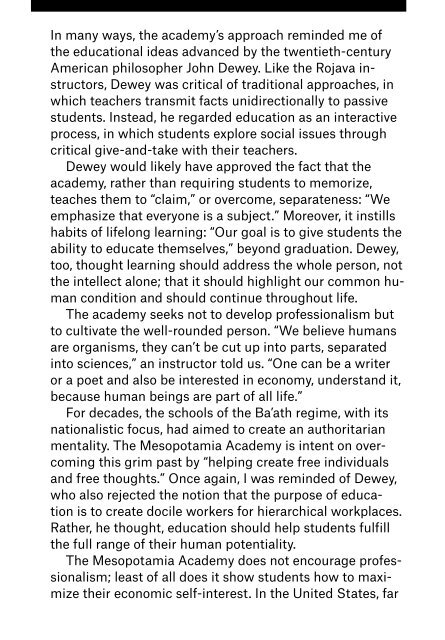Stateless Democracy
1RHiH4Y
1RHiH4Y
You also want an ePaper? Increase the reach of your titles
YUMPU automatically turns print PDFs into web optimized ePapers that Google loves.
In many ways, the academy’s approach reminded me of<br />
the educational ideas advanced by the twentieth-century<br />
American philosopher John Dewey. Like the Rojava instructors,<br />
Dewey was critical of traditional approaches, in<br />
which teachers transmit facts unidirectionally to passive<br />
students. Instead, he regarded education as an interactive<br />
process, in which students explore social issues through<br />
critical give-and-take with their teachers.<br />
Dewey would likely have approved the fact that the<br />
academy, rather than requiring students to memorize,<br />
teaches them to “claim,” or overcome, separateness: “We<br />
emphasize that everyone is a subject.” Moreover, it instills<br />
habits of lifelong learning: “Our goal is to give students the<br />
ability to educate themselves,” beyond graduation. Dewey,<br />
too, thought learning should address the whole person, not<br />
the intellect alone; that it should highlight our common human<br />
condition and should continue throughout life.<br />
The academy seeks not to develop professionalism but<br />
to cultivate the well-rounded person. “We believe humans<br />
are organisms, they can’t be cut up into parts, separated<br />
into sciences,” an instructor told us. “One can be a writer<br />
or a poet and also be interested in economy, understand it,<br />
because human beings are part of all life.”<br />
For decades, the schools of the Ba’ath regime, with its<br />
nationalistic focus, had aimed to create an authoritarian<br />
mentality. The Mesopotamia Academy is intent on overcoming<br />
this grim past by “helping create free individuals<br />
and free thoughts.” Once again, I was reminded of Dewey,<br />
who also rejected the notion that the purpose of education<br />
is to create docile workers for hierarchical workplaces.<br />
Rather, he thought, education should help students fulfill<br />
the full range of their human potentiality.<br />
The Mesopotamia Academy does not encourage professionalism;<br />
least of all does it show students how to maximize<br />
their economic self-interest. In the United States, far<br />
too many top students nowadays head to Wall Street for<br />
careers as investment bankers, but education in Rojava<br />
is not about “building a career and getting rich.” Rather,<br />
academy students are taught to “ask themselves how to<br />
enrich society.”<br />
John Dewey thought the ultimate purpose of education<br />
was to create reflective beings who participate ethically as<br />
citizens in the democratic community, and that education<br />
should thus be a force for social reform. As if echoing this<br />
thought, one of the instructors remarked to our delegation,<br />
“When we do science of society, what we are trying to do is<br />
struggle for social freedom.”<br />
None of the Mesopotamia Academy teachers mentioned<br />
Dewey, and I have no reason to think that they knew his<br />
approach — surely they arrived at it independently. But the<br />
similarity was nonetheless striking.<br />
I was also struck by a further coincidence. In the midtwentieth<br />
century, Dewey’s ideas influenced several experimental<br />
schools in the US. Most notable was Goddard<br />
College, located in central Vermont, which in the 1960s and<br />
1970s was a trailblazer in Deweyite education. During most<br />
of the 1970s, one of the teachers at Goddard College was anarchist<br />
Murray Bookchin, who taught his ideas there under<br />
the name of “social ecology.” Bookchin did not write much<br />
specifically about education, but his writings on democracy<br />
and ecology would go on, in translation, to influence Öcalan<br />
and the concept of democratic confederalism, the overall<br />
ideology to which Rojava is committed.<br />
Yekîtiya Star Academy, Rimelan<br />
The women’s academy — Yekîtiya Star Academy — in<br />
Rimelan pushes the educational approach of the Mesopotamia<br />
Academy further. Founded in 2012, its purpose<br />
is to educate female revolutionary cadres, so naturally its<br />
216–217



